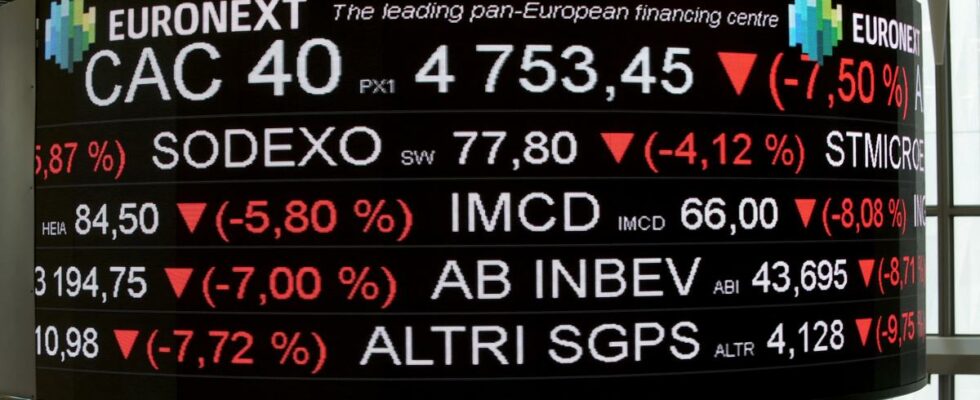” data-script=”https://static.lefigaro.fr/widget-video/short-ttl/video/index.js” >
Since the announcement of the results of the European elections and then the dissolution, the index has fallen by 6.23%.
Difficult week for investors. Since the results of the European elections and the announcement of the dissolution by the President of the Republic, the markets have been cautious to say the least. The downward trend accelerated at the end of the week, as the National Rally and the New Popular Front revealed their campaign orientations, some of which promise to be expensive.
On Friday, the CAC 40 lost 2.66% over the session, to 7,503 points. The French index, which had triumphantly crossed the symbolic bar of 8,000 points in March and has since multiplied records, has thus lost all its gains recorded since the beginning of January. Over the week, the decline exceeded 6%, at 6.23%, the worst decline since the Russian invasion of Ukraine at the end of February 2022. It dragged the SBF 120 into its fall, which fell 3% over the day. .
In Paris, “the presentation of the New Popular Front program accentuated the fall in the stock market and put pressure on the bond market”commented Alexandre Baradez, head of market analyzes at IG France. “The tax aspect mainly causes actions to react and the budgetary aspect causes the sovereign bond market to react”detailed the analyst. “We see that the left bloc which was put in place, more quickly than expected, has unpleasantly surprised the markets because in the first lines of the program a fiscal component seems quite important, including for example the restoration of the ISF » (solidarity tax on wealth), explained Alexandre Baradez.
Axa, Thales, Veolia, Alstom, Arcelormittal… The major French groups suffered the blow and also retreated. Banks were the stocks most neglected by investors this week, facing “a little panic” concerning the risk of breakup of the euro zone, according to David Benamou. Since Monday, Société Générale has lost 15.9%, BNP Paribas 12.9%, signing their worst week since March 2023, at the time of the banking sector crisis of bankruptcies in the United States and the takeover of Credit Suisse by UBS. Crédit Agricole lost 12.4%, its biggest decline since March 2022.
Read alsoShould you review your stock market strategy in the face of political uncertainty?
A borrowing rate which falls to 3.12%
Likewise, the uncertainty surrounding France’s political future caused the interest rate at which France borrows on the ten-year markets to jump this week. Established at 3.10% last week, it rose to 3.31% on Tuesday and fell to 3.12% on Friday around 3:30 p.m. The growing gap between the interest rate on ten-year French OATs (Assimilable Treasury Bonds, Editor’s note) – which reached 3.12% around 3:10 p.m. GMT – and its German equivalent which fell more sharply (to 2.35%) .
This difference between the two rates – or “spread” – is an indicator measuring investor confidence in France and its long-term economic prospects. It stood around 3:15 p.m. GMT at 0.76 percentage points. According to Bloomberg, its amplification over the week is at this stage the most significant since 2011, at the time of the debt crisis of the Eurozone states. “This gap shows us the degree of distrust regarding French debt compared to German debt”gold “the more this gap widens, the more the stock market falls”underlined Alexandre Baradez.
” data-script=”https://static.lefigaro.fr/widget-video/short-ttl/video/index.js” >

